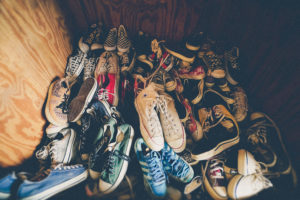Often, hoarding is not a choice. It’s a compulsion people feel. It can often be traced to a range of mental illnesses, or simply the desire not to let anything go, which can be associated with trauma and grief, emotional issues and not mental illnesses.
It can feel extremely tiring when trying to help a hoarder, because they often cannot change unless they are ready to. It’s the same story with helping an addict. You can force them to quit, you can give them endless speeches, but if they aren’t simply ready to move on, they will likely fall back into their bad habits time and time again. But should you give up on them? Well, it depends – no one should identify if you have ‘given enough’ of yourself, nor should they say it’s your moral responsibility to be for that person always.
If they need money to pay for the cost of therapy, then an equity release could be beneficial because it does not require having monthly payments and interest rates are low or none compared with credit cards or unsecured loans that have higher interest rates.
But you likely want to. Helping someone with hoarding issues is often something that runs along these same lines. The following advice should help you lovingly assist the hoarder in your life, and to do so incurring the least relational damage possible. Because of the dangers we just mentioned, we are going to assume that in your case, the hoarder is ready to move on and is willing to accept help.
Let us begin:
Help Them Attend Professional Help
Of course, you cannot begin to help them turn their lives around without the help of an accredited professional. If you fail to do this, you might notice that you spin your wheels, or potentially cause more harm than good – however great your intentions. Allow a hoarding treatment therapist to talk through their problems with them, and be sure to attend if you are allowed. However, if your relative or friend wishes to simply engage in the sessions alone, you must respect that. While the therapist might not be able to let you know about everything regarding their conversations, if the person you’re attempting to help has allowed it, you might be able to help with the solutions under the direction of this professional.
Cleaning
It can be hard for your hoarding friend to completely let go of everything at once. Cold turkey might not be the best solution for them. Also, simply throwing out everything might take power from them. Of course, rubbish or collected trash in the environment might be unsafe and unclean, and thus may need the attendance of a professional deep cleaning crew. Sometimes this might be ordered by the housing association or the government, sometimes you could go private. This might be depending on if the property is owned or rented. Simply seeing the home in a renewed state could give your friend a true emotional upheaval, and be sure to note this down for their next therapeutic session.
Careful Labelling
While the belongings of the household might not be worth keeping in their entirety, it can be worthwhile to walk around the house with your friend and label items. Some might be valuable and sentimental. Keep those. Some might be valuable but with little use for now. It could be that you find ‘self storage near me’ and house those items for now, so they aren’t lost, but your relative needn’t keep them around leading to further clutter. Then, throw out the items they might not need. Most hoarding begins with an inability of letting things go. It might start out with three spare microwaves in the garage ‘just in case’ or a collection of other items due to a hobby or interest. Helping them throw these items out, gently and carefully, can put the power back into the hands of your friend, and as they deal with this exposure therapy, they might realize letting go isn’t as bad as once envisioned.
Regular Attendance
Hoarding isn’t something that stops overnight. It takes months to fully untangle the emotional problems and difficulties that have led to this, because rarely does hoarding happen in a vacuum. Simply checking in on your friend continually can help them feel like they’re not alone, even if it’s just helping them attend therapy and heading for a coffee afterwards. Over time you yourself will be able to seperate the person you know from the hoarder that grew, and more importantly, so will they. This kind of social support is often the tipping point for new, positive habits to be built, and if things turn out well, they will thank you forever.
We hope that these tips can help you in this difficult situation.

